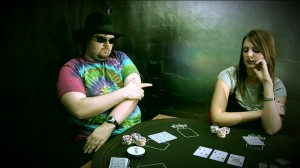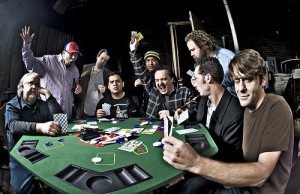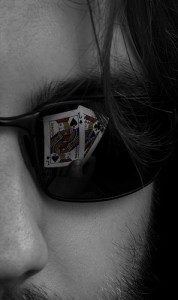“Reading someone’s “Tells” in a poker game
With the recent popularity of televised “Texas Hold ‘Em” poker games comes a new world-wide craze for poker and the strategies involved in winning. It’s no secret that more than half the skills needed to win at poker are about reading your opponent’s moves and body language, commonly known as “tells.”
Often times, players are unaware of what the subtle moves their body, eyes and behavior give away about their hand and how they feel about it. It’s especially true for players just out to have fun and maybe make some extra cash on a weekend in Vegas. A great poker player is constantly observing the tells and can pick up on when someone is trying to bluff their way out from behind a not-so-good hand. Understanding and picking up on these tells are half the strategy of the next move.
When it comes to reading the subtle clues of your opponent’s behavior during your games, it begins by just paying attention.
- Cool detachment. Yes, the stakes are high, and your nerves are rattling. But get out of the emotion of it by stepping into the director’s shoes, as opposed to being the actor on the stage. As the actor sitting at the poker table, your focus needs to remain engaged in the action there, but a part of you must also learn to step back and observe the scene from a broader range. From this detachment, you will be free to remove yourself from reaction and position yourself in a new controlled position of action and control, always the more powerful place to be.
- Size Them Up. Even before you sit down, begin to take mental notes on the other players at your table. Also remember to work quickly and concisely, because here, time really is money. Notice who the big bold players are, and also who the shyer, more reserved players are. Bold players will sit differently. They take up the whole chair, with bigger hand and arm movements, and often speak intentionally louder than everyone else, as a way to control the conversation. The less assured players will be sitting back trying to cover their cards with their hands and purposefully not making eye contact. Also remember that players will react differently during the shuffle than they do while the hand is being played.
- Learn the Tells. Look for any physical reactions going on with your opponent—eye twitches, blinking, fingernail biting, or any other tiny gestures they might be making. Notice what their breathing is like, but don’t jump to conclusions until you have studied this behavior. Accelerated breathing can often indicate good cards, but a great poker player will know to fake this to throw you off. Any color change in the skin, shifty eyes scanning what is left of the chips or gazing off as if distracted, shaking, jittery or fidgety movements. Watch, and wait, and see.
- Spend some time studying. Spend some time playing the table, watching and observing if indeed this particular tic precedes a good hand for them, or if this rubbing the eye always comes before a bad hand. Pay attention, because over time, you will get a gut feel for what you are picking up as the observer. As you watch the patterns of the players you start to feel the specific expression of everyone’s tells.
- Become aware of your own tells. Be exceptionally aware of the messages you are giving off. Don’t make any moves without forethought as it how it will affect your opponent, based on what you read in his tells. You might even have to spend some time practicing controlling your tendency to fidget.
- Sometimes, you want to make them think your hand is good. Commonly, a player will react meekly if they wish to throw you off. A good player will mix up their intentional tells, sometimes coming on strong with a great hand, sometimes playing it back. This kind of strategy is an equal part of the process of being an exceptional player. Acting in this way is considered a valuable skill in high stakes poker, almost as sly as counting cards.
- Discover the pattern of the other players’ behavior. Is it that they begin to talk when they had been quiet? Are they holding their arms differently? Open or protective? They may start talking when they were previously quiet. They may cross their arms differently or even hold their cards in a more protective manner. The keenest observer and shrewdest actor will be the big winner at the end of the day.
- Ignore the stare-down. Other players will inevitably try to intimidate you. One of the best defenses against this tactic is to purposefully stare back no matter what shape your hand is in. Be sure to not be consistent with your inconsistent responses!
- Forget the distracters. Poker players will go to great lengths to stretch the boundary of acceptable strategy. Some fakers will make disgruntled noises, or get loud and jocular, just to confuse you. Stay focused, detach and turn the tables by being in control of your own tells. Make these showboaters think they are getting to you, just to throw them off.
- When reading other players, understand pros won’t allow you to read them, which is why they are, of course, pros. However, most every game has amateurs, which you should be able to spot rather quickly.
No one is completely immune to giving off tells. But with patience, practice, perseverance and skill, over time you can learn the fine art of poker tells and how to exploit this information to gain advantage. If you spot a tell that means your opponent has the advantage, lay down your cards before the flop; when you find a player who is showing weakness, raise your bet. Just one more tool to get the win.



















May 31st, 2010 at 11:06 am
I would like to setup a blog like this. Any chance you could email me the webmaster’s info?
June 1st, 2010 at 12:03 pm
Thank you for your interest in our blog. Please contact [email protected] and they will be more than happy to set one up for you.
June 27th, 2010 at 6:12 pm
Great Job! I am going to spread the word that way you get new readers! Gamers will control the world!